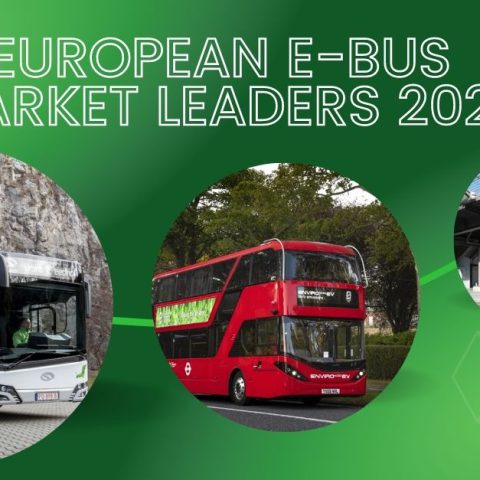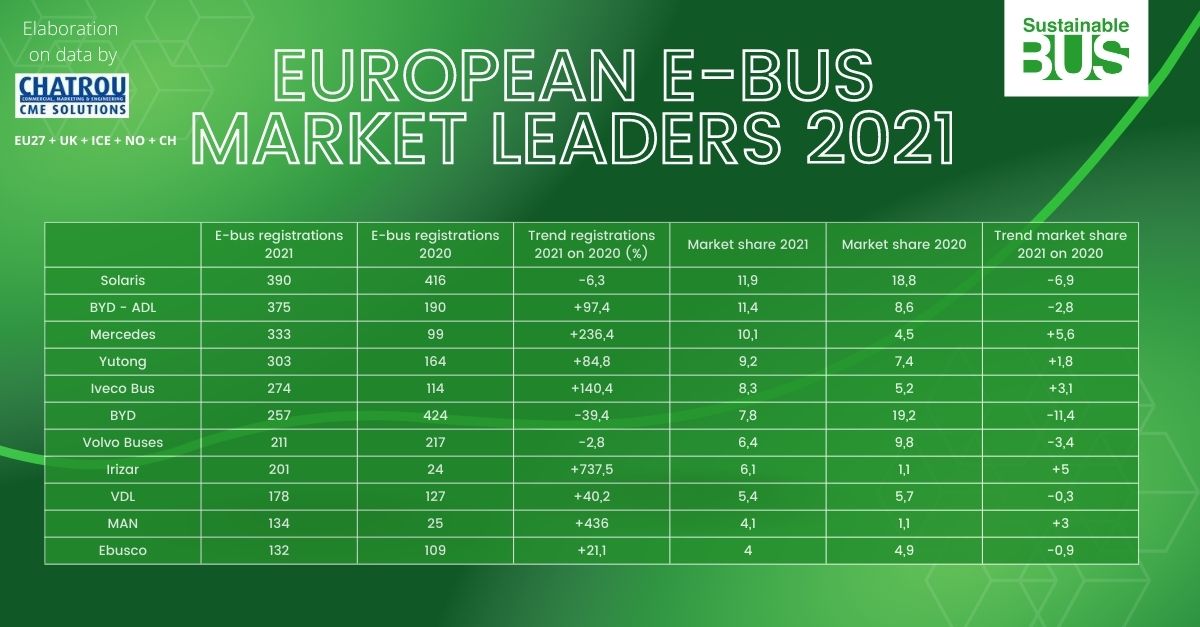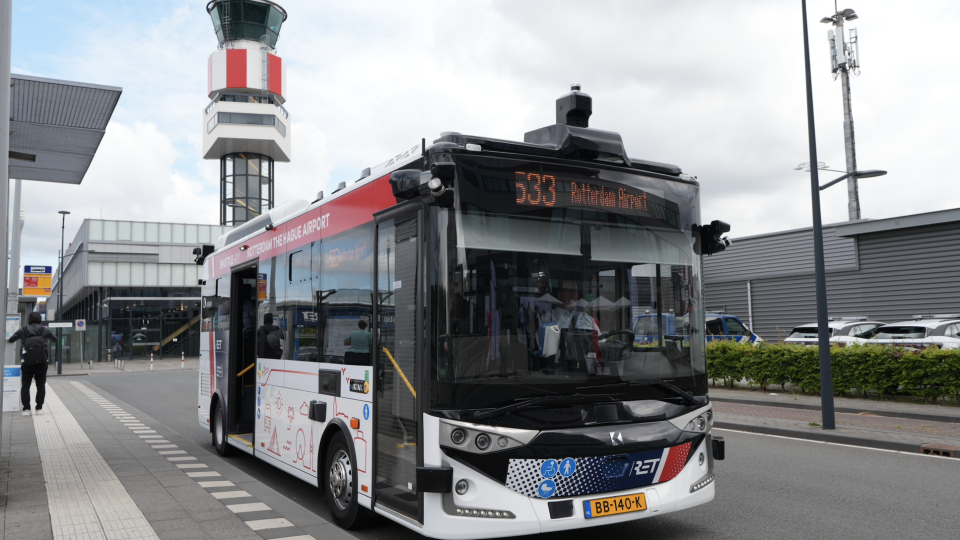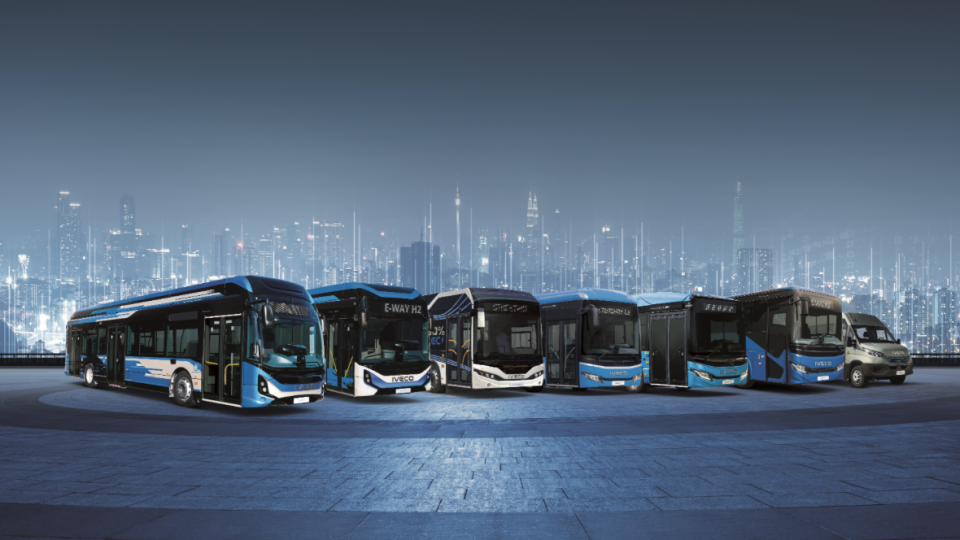EU electric bus market grew 50% in 2021 (over 3,000 registrations). Mercedes debuts in the leaders’ group
Electric bus registrations increased of 48% in 2021 compared to 2020 in Europe. 3,282 e-buses were delivered last year, bringing to over 8,500 the vehicles registered in the continent since 2012. What is worth mentioning, in 2021 for the first time as many as three European countries registered over 500 e-buses, with Germany leading the […]

Electric bus registrations increased of 48% in 2021 compared to 2020 in Europe. 3,282 e-buses were delivered last year, bringing to over 8,500 the vehicles registered in the continent since 2012. What is worth mentioning, in 2021 for the first time as many as three European countries registered over 500 e-buses, with Germany leading the shortlist (555 units) followed by UK (540) and France (512).
Market leaders? Solaris with 390 e-buses delivered, followed by the joint venture between BYD and ADL with 375 e-buses registered in UK market. Third, the new entry (in the e-bus segment) Mercedes: as many as 333 eCitaro were delivered since January to December 2021.
2021 has also been a watershed year for fuel cell buses: with 158 registrations, that market grew of 236% (in 2020 47 H2 vehicles were delivered). Market leader? Wrightbus with as many as 71 deliveries, followed by Solaris with 37.
Over 60% of new city buses are ‘alternative’
E-buses last year accounted for over 20% of the city bus market (21.7, being specific). It means a constant growth compared to the 12% in 2019 and 15% in 2020. The 2021 share is in line with the 22.5% of zero emission buses mandatory in public tenders in Western European countries (as decided upon the EU Clean Vehicle Directive).
All in all, according to data collected and analyzed by Chatrou CME Solutions and based on EU27 + UK + ICE + NO + CH, almost 60% of the city buses registered in 2021 had an alternative driveline (it was 53% in 2020, 39% in 2019).
Taking a look at the figures split for manufacturers, what is easy to notice is an opening of the market, more populated of players. In 2020 half of the market was in the hands of three manufacturers: BYD, Solaris and Volvo Buses had respectively 20, 20 and 10% of the market shares regarding e-buses. In 2021 we needed five bus builders to reach 50% of the market shares. Half of the market belong to Solaris, BYD – ADL, Mercedes, Yutong (another surprise of last year!) and Iveco Bus – Heuliez. The market leader has 12% of the market, in 2020 it was 20%.

Mercedes, Iveco and Irizar growing
Solaris keeps a leadership position with a very similar number of registration than in 2020, around 400. ADL – BYD grows from 190 to a striking 375 (with BYD stuck at 257 after a great 2020). It’s impossible not mentioning the (easy to predict) leap forward of Mercedes, that had delivered 99 e-buses in 2020 and reached 333 in 2021 (+ 236%). Also Yutong had a glorious year, nearly doubling the 164 registrations of 2020. The last ‘winner’ of 2021 chart is Iveco Bus – Heuliez Bus, with 274 deliveries (+140%).
The fastest growing company in terms of units delivered, anyhow, is Irizar e-mobility: registrations went +737% in 2021 on 2020 (from 24 to 201). Also MAN is growing, with 134 in registrations that means a +436% on 2020. Lagging behind, despite the great hype generated by initiatives such as the listing on the stock exchange and the delivery of the very first 3.0 models, is Ebusco, that loses a point in market share (5% in 2020, 4% in 2021) while slightly increasing volumes. Large new orders such as the one signed in Berlin and the fleet of vehicles to be launched in spring in Schiphol areas can contribute to an increase of figures in 2022. Lags behind (as in 2020) also VDL, market leader in the segment until 2019.
CNG buses gain share in intercity segment
Focusing on the alternative driveline buses out of the battery-electric boundaries, hybrid buses saw a slight increase (3,285 units, +12% on 2020). A trend pulled by mild hybrid application which are gaining ground in several markets.
CNG bus registrations, on the other hand, slowed down after two years of high increase. 3,088 CNG buses registered in 2021 means a decrease of 2% on 2020. What is remarkable, anyhow, is that «CNG-share in the interurban segment is growing rapidly», the consulting firm points out: out of the 3k registrations just mentioned, 864 are for Class II and Class III vehicles (it was 539 in 2020).








